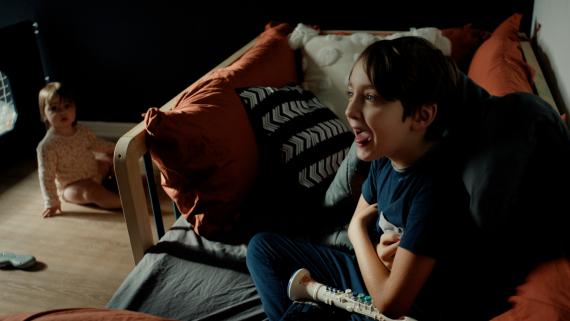Charlie has profound autism. Charlie’s struggles are severe and life-threatening. Charlie has no sense of danger, which manifests in different ways, like running in front of cars. The most upsetting manifestation is called Pica. Eileen Lamb When I was pregnant with my firstborn, Charlie, I daydreamed about motherhood. I pictured Charlie as a child sitting beside me outside at sunset, debating which Pokémon is a better starter option in Pokémon. I imagined a toddler yelling “no” because I gave him the green sippy cup instead of the red one. I pictured Charlie running to me while screaming, “Mommy!” after he hurt himself. I saw myself speaking French with Charlie and secretly laughing at the first “putain” he pronounced. But that has yet to happen. Not because Charlie doesn’t like Pokémon, never disagrees with me, and speaks English rather than French. These daydreams aren’t our reality because Charlie has profound autism. I was born and raised in France, a little town near Paris. I had a mostly happy childhood but struggled with not fitting in. It always felt as if I was born on the wrong planet. At 21, I moved to Texas to become an Au Pair, hoping that a change of country might be what I needed, and in many aspects, it was. I felt at home here, in Austin. People instantly accepted my quirks and French accent. However, it was only after Charlie’s diagnosis that the pieces started to fall together. I was diagnosed with autism, too, at the age of 26. Charlie has two younger siblings, Jude and Billie. Jude is eight and also on the spectrum. But Jude and I were diagnosed with Level 1 Autism. Our struggles are much different from Charlie’s. Jude can tell me which starter Pokémon is his favorite, and he has no issues yelling “no” at me and saying bad words in French. Charlie’s struggles, on the other hand, are severe and life-threatening. Charlie has no sense of danger, which manifests in different ways, like running in front of cars. The most upsetting manifestation is called Pica. Pica is an urge to eat inedible items. Several times a minute, Charlie will try to eat something—paint off the wall, wrappers, coins. Recently, a GI surgeon pulled a screw and other items out of Charlie’s colon. Not a tiny screw. A long screw. It’s a terrifying behavior, and if it weren’t for the help of his ABA therapists, I don’t know what we would do. I am grateful that Charlie was able to receive ABA services early on. I took the M-CHAT online, available on the Autism Speaks website, and Charlie scored 18 out of 20, where a score of 3 or above represents a risk for autism. Thanks to the M-CHAT, we secured an appointment with the developmental pediatrician quickly, and he was diagnosed with autism a few months later. While Charlie remains nonverbal, ABA has given him a way to communicate basic needs through an AAC device. Additionally, he has acquired self-care skills such as brushing his teeth, getting dressed, and using utensils. Charlie requires 24/7 supervision. It’s impossible to look away for even a few seconds, as he might put himself in danger or damage things around the house. I applied for respite care almost nine years ago, around the time of Charlie’s diagnosis, but I’m still on a waiting list that could extend for another 15 years. I need more help, but the available funding falls short. Increased funding is essential so autistic people like Charlie can learn to keep themselves safe and caregivers can have some much-needed time for themselves. Profound autism often brings challenging behaviors with no easy solutions. I am so thankful for the resources that have been made available by Autism Speaks, like the M-CHAT which is a screening tool for autism, and ABA therapy, which is an evidence-based therapy that helps autistic children learn essential skills such as communication, self-care, and safety. However I know there is a pressing need for greater awareness and increased research to uncover new opportunities. Watch this mini-documentary about our family, profound autism and Charlie’s challenging behaviors, especially pica: https://www.youtube.com/watch?v=MclfnqZ5zW4&t=1s
This content was originally published here.
